With the continuous rise in fuel prices, residents of Port Harcourt have expressed frustration over the persistent fuel hikes and ongoing scarcity in the state.
Several residents who spoke to our reporter on January 20 shared their experiences and voiced their concerns, questioning why fuel prices continue to climb sharply at some fuel stations despite efforts toward refinery revitalization.
During visits to various stations across key areas, including Jodil Energy, AP, Richpon, Fudebik, and Matrix filling stations in Port Harcourt, our reporter observed that fuel prices, previously ₦910 per liter, have now surged to ₦1,050, with some stations selling at ₦1,040. The high costs have left many stations with only a few customers, highlighting the financial burden faced by residents.
Michael Okpara, a private driver and resident of Port Harcourt, shared his perspective on the challenges faced by Nigerians while queuing at the Matrix fuel station along Airport Road. He attributed the escalating cost of fuel to the continuous rise in the exchange rate and urged the Federal Government to take decisive steps to stabilize the naira.
According to Okpara, the focus should shift from merely addressing fuel prices to tackling the underlying issue of currency depreciation. “The real question we should be asking is why the dollar is so high, not just the price of fuel,” he said. “If the dollar were valued at $1 to ₦200, fuel wouldn’t cost more than ₦200 to ₦250 per liter. Our problem is not the fuel price but the dollar. Why did they float the naira?” he asked.
Okpara highlighted the ripple effects of the naira’s depreciation on the cost of living. “If they are telling us that fuel costs ₦1,300, they justify it by saying it is still cheaper compared to the U.S. But if the dollar rate drops, the cost of living will ease,” he explained.
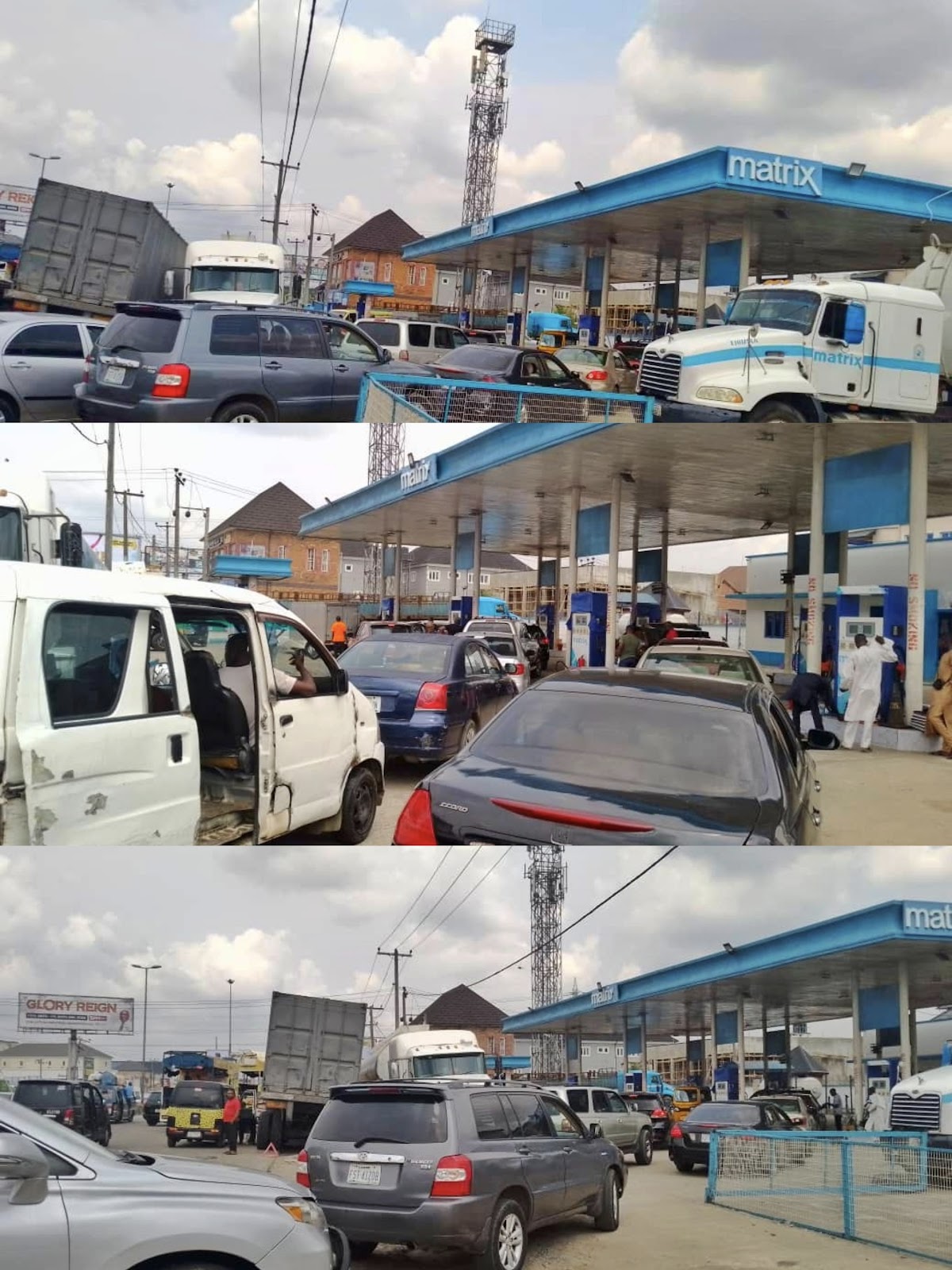
Matrix Filling Station, located along Airport (PC: Our Reporter)
Similarly, Femi Oluwatuji, an elderly commercial driver, shared his frustrations during an interview at the park along New Road Roundabout on the Eliozu Expressway. He highlighted how the rising cost of living, coupled with stagnant wages, has exacerbated the financial struggles faced by many.
“What can we even do with the little we earn, considering the state of the economy?” Oluwatuji asked. “But why does the government always calculate things in dollars? Are we using dollars in this country?”
Oluwatuji also expressed deep disappointment with the government, accusing them of failing to deliver on its promises. He recalled the commitments made by President Bola Tinubu when he assumed office.
“When Tinubu came, he promises that by December 2023, the refinery would be operational. Since then, has it worked? Before he assumed office, the cost of fuel was approximately ₦198 per liter. Now, how much is it?” he lamented.
The driver further questioned the state of the nation’s refineries, alleging a lack of transparency and accountability.
“For how many years has our refinery been down? Why can’t they fix it?” he asked, referencing reports that the refinery was announced as operational but allegedly collapsed within days.
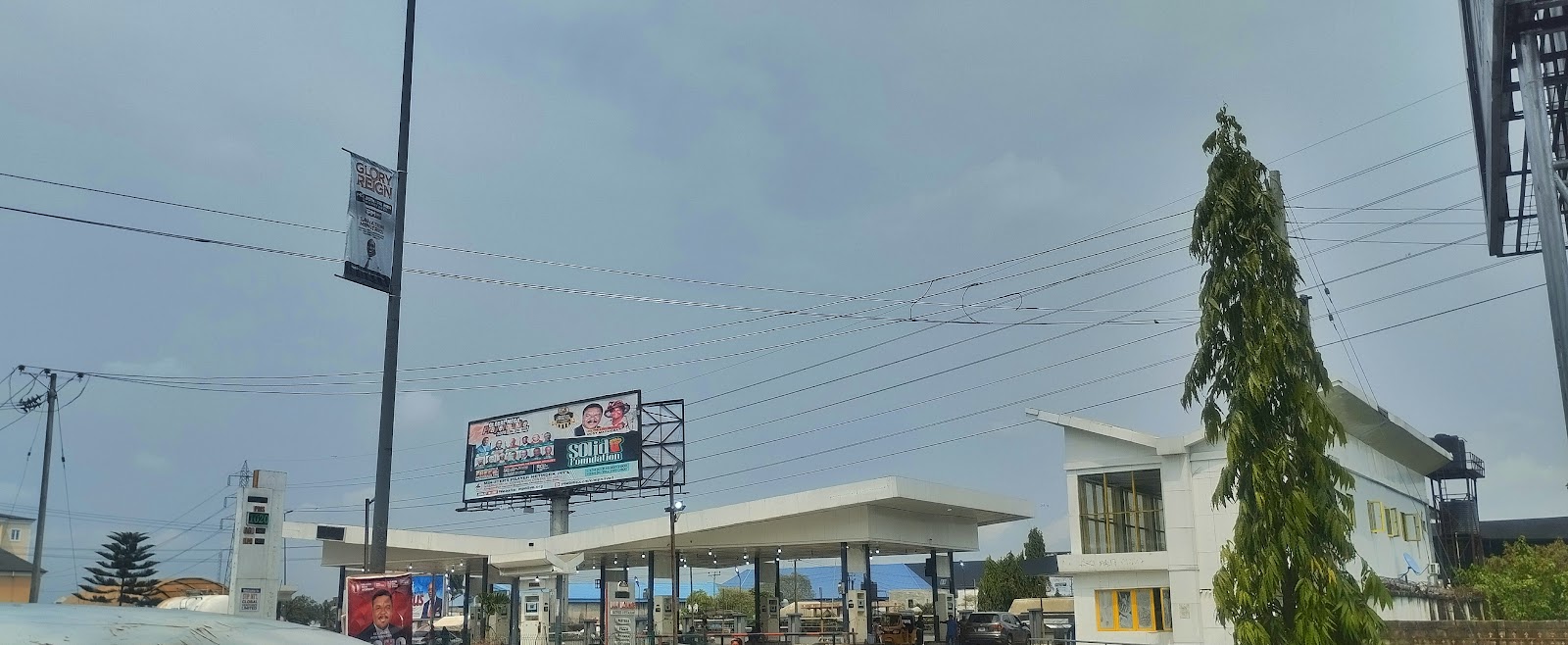
Richpon Filling Station
The elderly driver also highlighted a recurring trend during fuel scarcity, alleging that many fueling stations hoard fuel to sell it at higher rates.
“Some stations are already shutting down, pretending they have no fuel. But when they reopen, they might sell it at ₦1,200 per liter,” he claimed
Blame Game: Fueling Stations Accused of Price Manipulation
Commercial drivers have voiced their frustrations, accusing fueling station staff of contributing to the rising fuel prices through alleged price manipulation.
Joseph Nna, a commercial driver along the Eliozu route, expressed concerns about the exorbitant prices and alleged tampering with fuel pumps. According to him, these practices make it nearly impossible for drivers to earn a decent profit as fueling stations inflate costs unnecessarily.
“Some filling stations have even started reducing the fuel gauge, so ₦1,000 worth of fuel doesn’t last as long as it should,” Nna revealed. This manipulation, combined with the poor state of the economy, has made it challenging for drivers to transfer the increased cost to passengers.
“Previously, the fare from here to Air Force Base was over ₦300, but since passengers don’t have much money, we reduced it to ₦300. Some drivers are even pushing to increase it to ₦500 from Rukpokwu to Air Force Base, but we understand that many people earn low salaries and will suffer,” he explained.
Nna recalled purchasing petrol at ₦990 per liter last week, only to see the price climb to ₦1,020 within a few days.
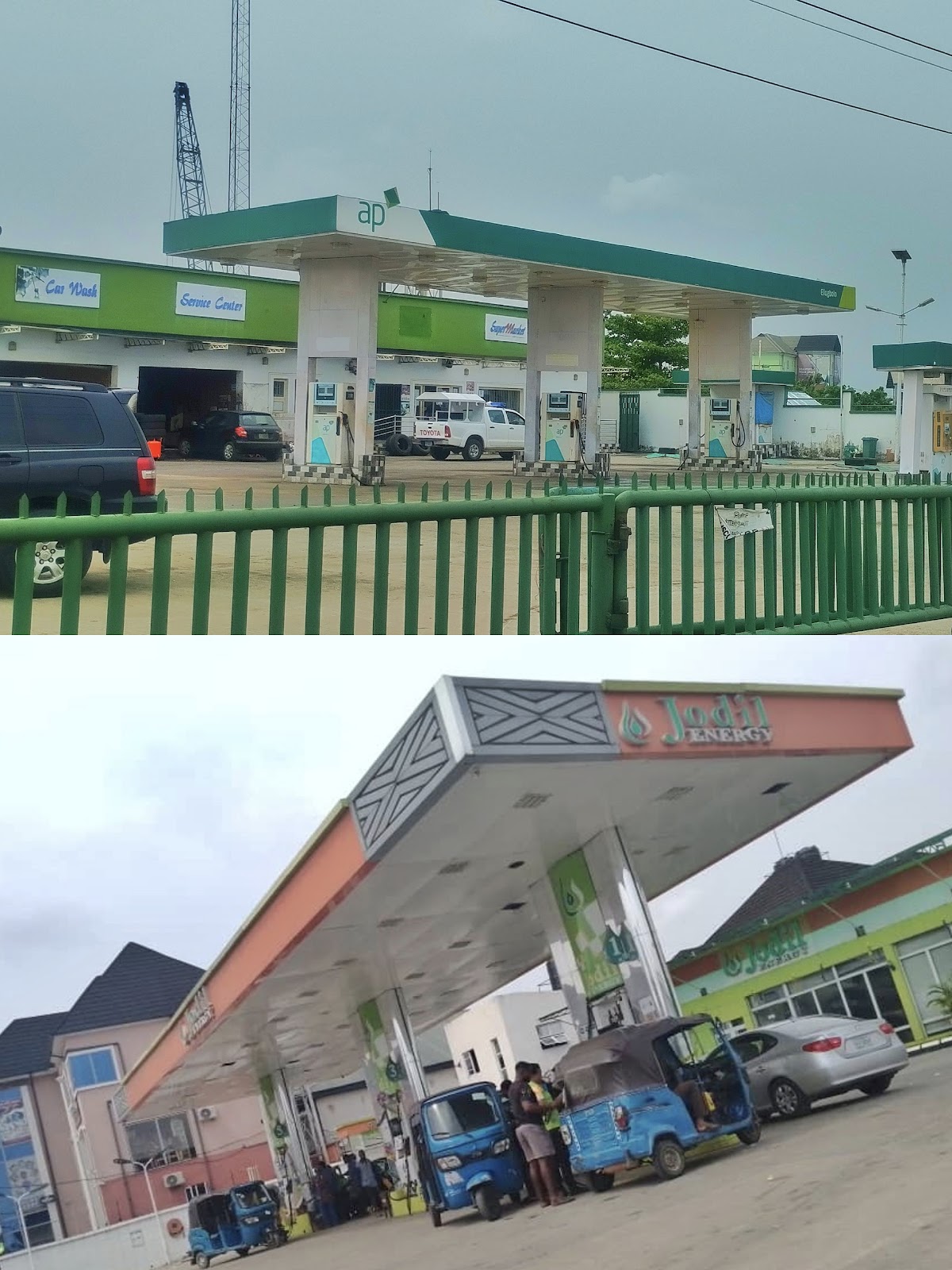
AP Filling Station on the top while Jodik Energy at the bottom
He attributed the ongoing crisis to the inefficiency of the Port Harcourt refinery, stressing that the situation could have been avoided if the refinery were operational.
“If our refinery was working, fuel prices wouldn’t be fluctuating like this. We are suffering, yet people blame us drivers. When we go to the market, everything is expensive, so how can we still charge ₦300 per trip? People shouldn’t blame taxi drivers—we are also struggling,” he lamented.
Nna also highlighted the daily financial struggles faced by drivers.
“Sometimes, we make ₦10,000 in a day, but after buying fuel, we have nothing left to take home. Our wives might even think we are spending money carelessly, but the truth is fuel takes everything. The problem is either the government or the exchange rate,” he said.
A few weeks ago, there was a glimmer of hope when fuel prices slightly dropped, but the recent spike has dashed those expectations.
“The government doesn’t care about the people. We were happy two to three weeks ago when fuel prices started coming down, but now they’ve risen again. The government is wicked,” Nna concluded.
Another commercial driver, Mr. Ifeanyi Duru, shared his challenges in navigating the fuel crisis.
“I bought fuel at ₦1,040, and the government is quoting ₦998 per liter in some parts of the country. We don’t even know who to trust anymore. They said the price would stabilize in a week, and for a short time, it seemed to drop. Now it’s rising again,” he explained.
Mr. Duru described the toll the current fuel price hike has taken on his business. He noted that continuing operations is the only viable option despite mounting losses.
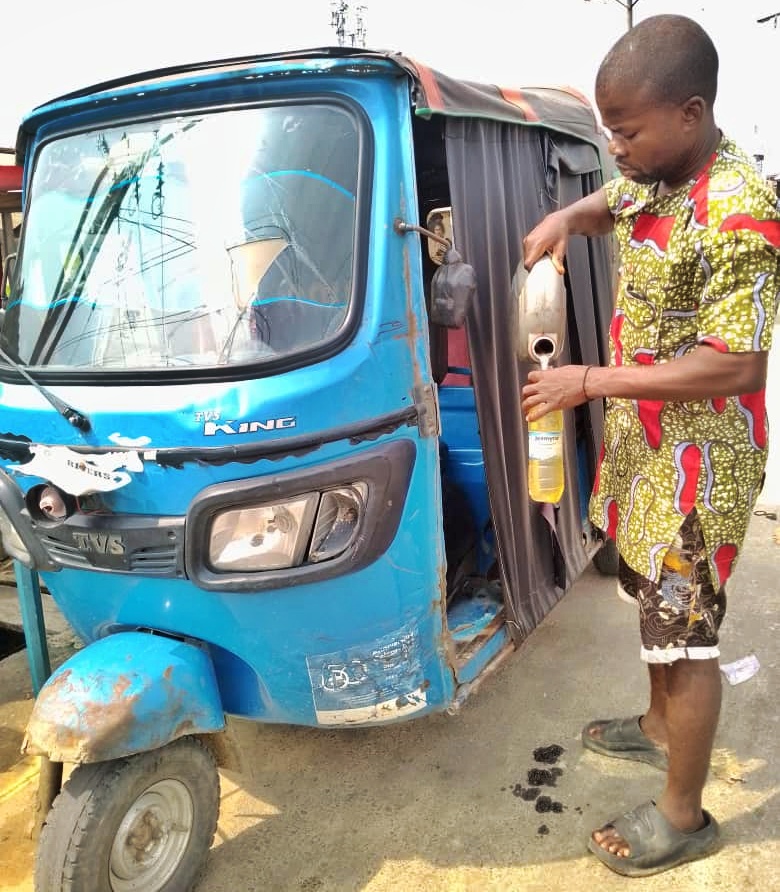
Mr Ifeanyi Duru
“For coping, we try to tell passengers that fares have increased, but they don’t agree. They say prices should come down because they heard the Port Harcourt refinery is working. But we have no choice—we can’t park our Keke. We have to keep working,” he said.
Long Treks and Transport Shortages
Passengers are also feeling the pinch of the fuel crisis. Chidera Saviour, a commuter, recounted her ordeal, explaining how the unavailability of tricycles, commonly known as Keke, forced her to walk long distances.
“After dropping my siblings today, I had no choice but to walk because tricycles are not available due to the fuel crisis,” she said. Reflecting on the impact, she added, “I’m now suffering from leg pains.”
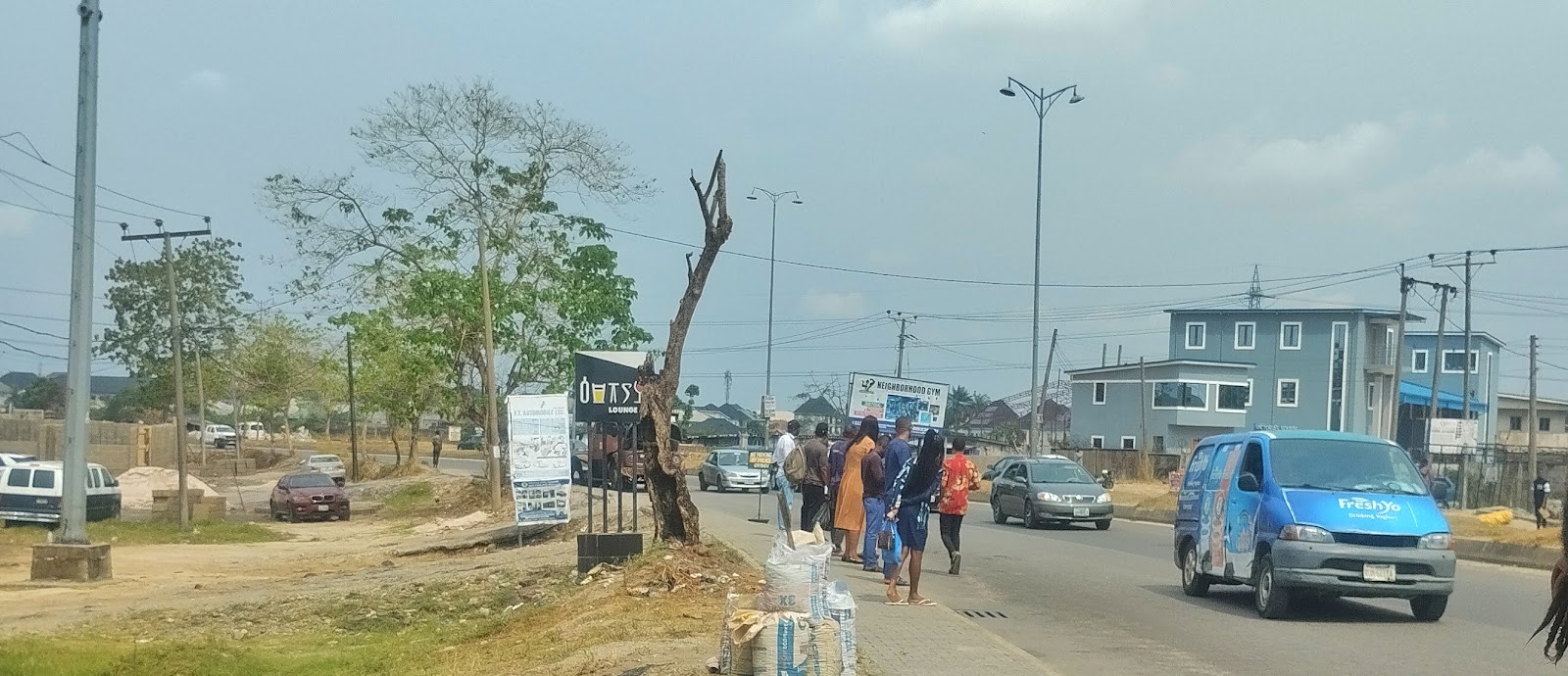
Passengers waiting for cab along Eliozu Expressway
The ongoing fuel price crisis continues to wreak havoc on commercial drivers and commuters alike. While drivers struggle with dwindling profits and increased operational costs, passengers bear the brunt of higher fares and transport shortages. Many believe that a resolution lies in addressing refinery inefficiencies and ensuring a fair and transparent fuel market.


